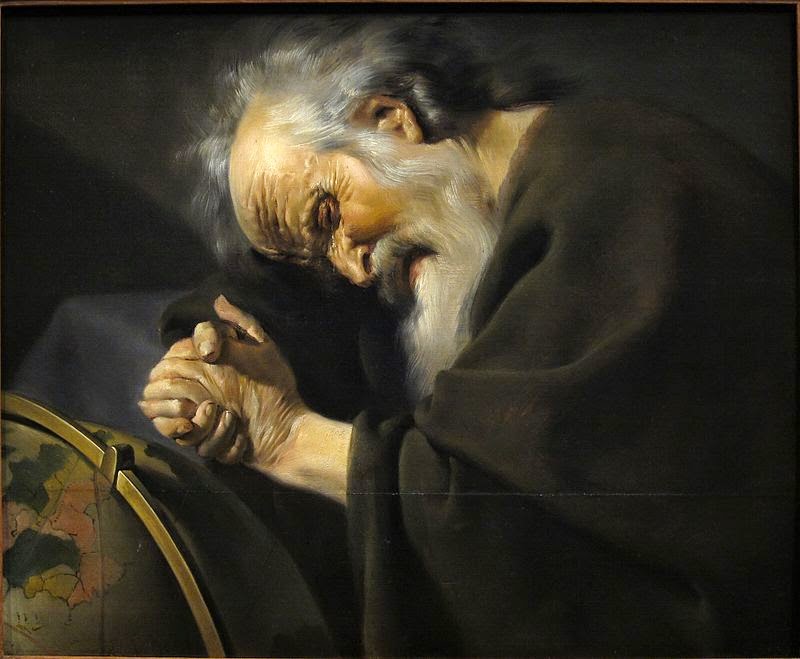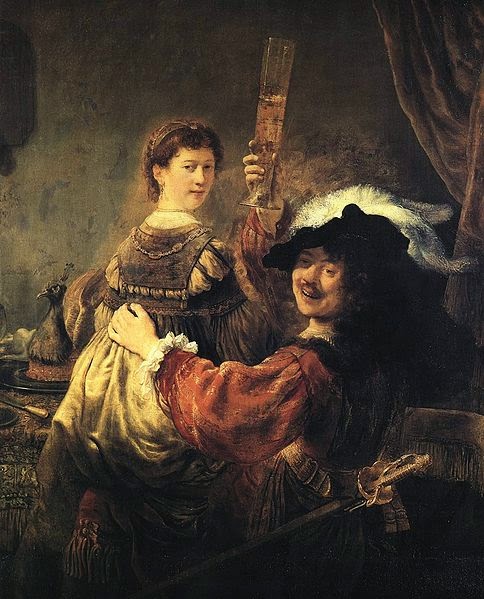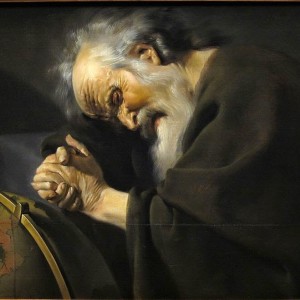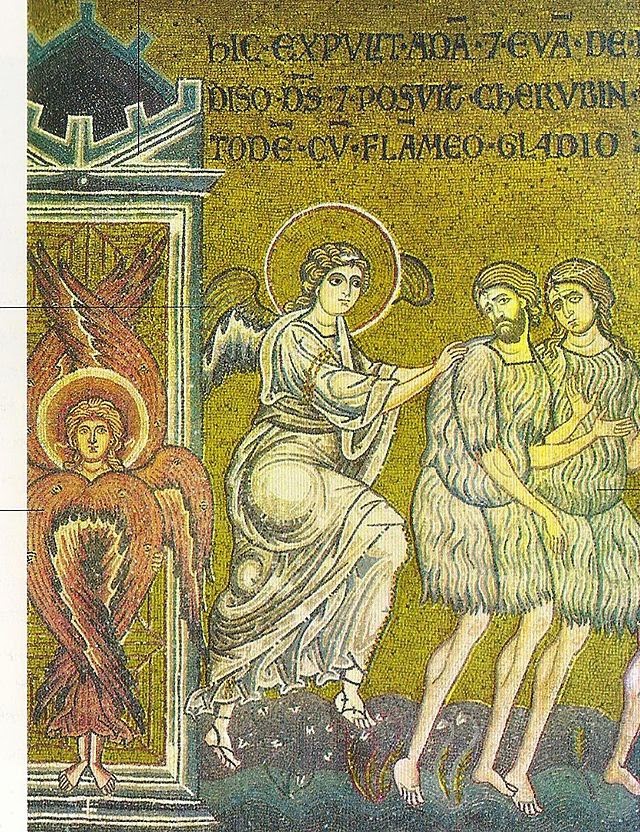 |
| Johannes Moreelse, Heraclitus (1630) |
Man knows two things: how things are (the World), and how they should be (the Ideal). I don’t mean that he knows these things perfectly, or that every man completely agrees with every other man about what is or what ought to be. But everyone has some sense of these two things, and tragedy – all tragedy – can be traced to the chasm between the two. Together, these two observations form a single insight: things are not as they should be. The larger the gap between these two things, the greater the tragedy.
It is necessary to know both of these things – the World and the Ideal – to experience tragedy. There could be no experience of tragedy if everything were how it ought to be, or if we had no sense that things ought to be other than they were. Neither the beast in the field nor the angel in Paradise feels the anguish of tragedy. But man, in this “valley of tears,” does feel it, because he sees that things are not as they should be. He is like the beast, but without the tragic ignorance; like the angel, but without Paradise.
This is not just a truth about the external world. It’s also a moral assessment of man, and a damning one. You know how you have acted, and you know how you ought to have acted. It’s here that we encounter some of life’s deepest tragedies. Worse yet is the twofold recognition that you’re 1) even now not living the way that you know you should, and 2) not able to be the man that you know you ought to be.
If the entire drama of human tragedy is this war between how things are and how they should be, between the World and the Ideal, how can we be freed? Left to our own devices, we are faced with only four options: overturn the World, abandon the Ideal, both, or neither.
Overturning the World was the most promising of our options. It recognized that the problem is not within our ideals or our interior longing for paradise but within the injustices and failings of daily life. If we could only actualize the Ideal, we could usher in Utopia. But the twentieth century is replete with examples showing how well these utopian crusades fared in practice. Instead of producing a Garden of Eden, these attempts resulted in a horrifying Necropolis.
In fact, even that is putting things too mildly. A Necropolis is a “city of the dead,” while former National Security Adviser Zbigniew Brzezinski places the number of “lives deliberately extinguished by politically motivated carnage” throughout the last century at “no less than 167,000,000” and “quite probably in excess of 175,000,000.” That’s not a city. That’s the combined population of the United Kingdom, France, and Spain. So it’s not just that our attempts to achieve the Ideal have failed. It’s that, more often than not, these attempts have only increased the tragedy.
 |
| Rembrandt, The Prodigal Son in the Tavern (1635) |
Abandoning the Ideal. As this striving for Utopia has repeatedly proven disastrous, we are currently trying its opposite: a sort of resignation. If we cannot overturn the World to achieve our Ideal, perhaps we should reject our Ideal. And so we have tried every method that we can imagine. We’ve declared ourselves “good enough,” “basically good people,” pretending that we don’t see the gulf between our actions and our ideals. We’ve proclaimed ourselves ignorant, trying to lose the Ideal in the mists of moral relativism, writing off our misdeeds as mere differences in preferences, rather than real, and tragic, failures. We’ve told ourselves that every ideal or belief, no matter how secular, is a form of “religion” to be rejected as irrational. We endorse a hedonism that acts as if the World is the Ideal. We pretend that the World shouldn’t be any better than it is, that we shouldn’t be any better than we are, and yet we fail to convince even ourselves.
When all of this fails, we simply distract ourselves with the pleasures of the flesh. If we cannot make ourselves angels, we will try to make ourselves beasts. Some of these pleasures are obvious enough: the so-called “pleasures of the flesh,” like sex, drugs, and pornography.
But more often, we lose ourselves in mindless diversions, both on the Internet and “in real life” (a term that has, for many of us, become grimly ironic, as more waking hours are spent online than off). These diversions – sitcoms, social media websites, games, and the rest – are not necessarily bad, of themselves. But when we spend our days chasing our tails rather than our ideals, it’s worth asking what these diversions are diverting us from. We don’t want to ask that question, but we cannot ignore it entirely. Even in the world of escapism and distraction, we find ourselves haunted by the Ideal, and we cannot hold on peacefully to an intentionally meaningless existence. We never fully succeed in lowering ourselves to the level of beasts, and our mindless entertainment can’t drown out our minds completely. We can bury the Ideal, but not kill it.
And so tragedy finds its way even into our life of diversions. Nowhere is this clearer then in the man who has pursued these worldly pleasures with reckless abandon.. Having found that fleeting pleasures flee, he eventually but necessarily slides helplessly into ennui or outrage.
A little of both. The third option, then, is to attempt a sort of balancing act in which we reject ideology and ideologues, but tell ourselves that we still have ideals. We hold to loosely-defined principles and “beliefs” that give us a sense of meaning, but which we can abandon or ignore when convenient. Rather than escaping from the tragic, this risks amplifying it, by acknowledging it without doing anything serious to solve it.
Absurdity and despair. Having seen the futility of our efforts at achieving the Ideal, and the impossibility of avoiding it, we are left with one last option: give in to the tragedy. Sometimes, this takes the form of embracing despair, the approach advocated by absurdism. In his commentary on Camus’ The Stranger, Sartre writes that “the absurd man will not commit suicide; he wants to live, without relinquishing any of his certainty, without a future, without hope, without illusions.”
But suicide remains an ever-present possibility, a final, desperate attempt to flee tragedy. Some of the clearest-thinking atheists, have seen this. Camus opens The Myth of Sisyphus by declaring, “There is only one really serious philosophical problem, and that is suicide.” But even those who don’t believe in hell can recognize this for what it is: not an escape from tragedy or a triumph over it, but a surrender to it.
So far, then, this might not sound like the Good News of the Gospel. But in a real way, this is the prolegomena to the Gospel. What we’ve just heard is the secular story of the Fall. Genesis 3:24 tells us that, after the Fall, God “drove out the man; and at the east of the garden of Eden he placed the cherubim, and a flaming sword which turned every way, to guard the way to the tree of life.” You don’t need the Bible to tell you this, because you already know it. You’ve seen and felt within yourself a sense of the Ideal, a sort of homesickness for Eden and for Heaven. But you’ve also seen within the world, and within yourself, that something has gone seriously awry.
You see within yourself the need for salvation, and if you’ve been paying attention, you’ve also seen that you’re incapable of saving yourself. None of us can, no matter how hard we try. It’s precisely here that we encounter Jesus Christ and the Gospel. Revelation shows us why we long for the Ideal: we’re made for Him. And it shows us why we fall short: we’re sinful, fallen creatures. We need grace. Through the Cross, the Gospel gives meaning to tragedy. And best of all, Christ offers us a way out of tragedy, the only way out. We cannot make ourselves angels, and we don’t have to be beasts. We can be Saints instead.



Amen and amen. God has put eternity into the hearts of men. Yet, even though we know God we do not honor Him as God or give thanks, becoming futile in our speculations, these diversions from the sense of the divine that we know is there. We are sinful, we fall short of the glory of God, the God in Him alone there is righteousness (Is 45:24). Justice must be served. Who can save us from this body of death? Jesus Christ, our Lord and Maker.
Yes, Adam and Eve were ejected from Eden and were forbidden to eat from the Tree of Life. However, today, we know that “Wisdom is a Tree of Life.” – Proverbs 3:18
For Jesus has three names: Morning Star (Revelation 2:28-29), Hidden Manna (Revelation 2:17), Tree of Life (Revelation 2:7).
Thus, The Tree of Life is the Third Name of God the Son.
The Revelation has been given to you. It is time for us to UNITE THE FAITH. https://youtu.be/t0dQOYMkZOo
The beautiful thing about God is how even in great tragedy, such as with the Fall of Adam and Eve, God is still very present and providing aid and guidance. This can be particularly noticed when Adam and Eve take meager fig leaves so as to make clothes for themselves after their sin. But note what the caring Father and Lord does, though. He knows that these are in no way sufficient protection for them, and so He Himself makes new clothes from ‘the skins of animals’ for them before they are expelled from Paradise, and into the harsh new reality, and environment, that they had merited. So even after great and ‘deadly’ sin, God is still shown to be tenderly caring for HIs children.
This also reminds me of Jesus, when He speaks of ‘not being concerned what we eat or drink, or the clothes we wear’. And, ‘If God clothes the lilly of the field with such splendor, will He not also clothe you, O you men of little faith?’ As God prepared Adam for life after the Fall, so also, He prepares us for our future ‘Eternal Life’ after we leave this world.
May we all accept this Divine and loving care, and also follow all of the guidance and commandments that He provides to us in so many ways, but particularly through Sacraments and teachings of His Holy Church!
Thanks for this thought-provoking piece Joe. It seems that ideals can be mythical or factual. Santa Claus is an example of the former. Reasonable adults aren’t actually bothered by the fact that he doesn’t exist; as such no tragedy manifests. But as you say, reasonable adults really do experience tragedy. One asks what makes that possible. As you suggest, only the loss of a factual ideal precipitates tragedy.
Given that factual ideals do exist, where can we find them? Some today would say empirical science alone. Others would say in serving our fellow men and women and children. Considering science alone, it seems to be quite tempero-centric (meaning it discriminates against those who lived before us) as it discounts all the attempts at the ideal prior to modern measurement and instrumentation (circa 1800). Could you imagine telling Homer that he was born too early? Or Da Vinci that he missed the boat?
The latter (service) certainly has praiseworthy aspirations. But factual ideals need be really be reachable. Otherwise there is a great existential disjunct built into the world and that seems most inconsistent with every other true desire of the heart and its object. For example, I’m thirsty and water really exists to satiate that thirst. Many attempts at human service today, it appears, rely solely on human power and as such don’t really address the causes of those problems that have brought the attempts into existence in the first place.
Just check out this coffee-brewers’ homepage.
http://www.starbucks.com/
They have irons in the do-gooding fire. But they appear to rely completely on human strength to get those things done. I am willing to bet $100 bills to pennies that the objects of their philanthropy (weak communities, poor post-secondary education) will still exist in your grandchildren’s’ lifetimes. As such the factual ideal they seek is not reachable with their chosen means. I don’t doubt that many well-intentioned people are involved in these services. But they won’t solve those problems and may even be mis-guided. As an analogy, think about if you went to a doctor for your broken leg and he gave you Tylenol. Wouldn’t you be thinking, “thank you sir but can we actually do something about this leg problem?”
As you suggest Joe, Jesus Christ is the source of the factual ideal (holiness) because he was and is a living and breathing example of it. Even more incredible, he knows our weakness and invites us to participate in his divine life through confession and then Eucharist such that our own failings are burnt up like straw in his mercy and we become like him. What wondrous love is this!
Where do I mail my 5 pennies?
I’ll start praying that they have a hostile takeover by a pious hedge fund……if they actually exist. 🙂
Man should know 3 things: How things were, how things are, and how things should be.
Without knowing the past, Man is certain to repeat history.
How can Man know how things should be without first knowing the past?
CHANEL(シャネル)とは何かというと、ココ・シャネルが始めたファッションブランド。元々は帽子の専門店 「シャネル・モード」の創設からスタートしました。どのバッグを買おうか悩むのは、日本女性にとって喜びのひとつ。どんな大きさのエルメスバッグ 偽物を洋服に合わせるかによって、人に与える格好のジャンルが大きく変わってきます。グッチ・シャネル・ヴィトンのファッションブランドを始め、一流バッグはやっぱり安く売っている店がありませんね。アウトレットの値段でなるべくGETしたいものです。ハイブランドを身に着けているとどうしてだか気持ちが落ち着くだけでなく、自分がちょっとしたセレブになれたような気分に。つまりは、内面から満たされているように感じると言われています。安価に入手できるだけでなく、国外の一流ブランドの商品には海外でしか手に入らない物などが数多く揃っているので、そうした珍しい商品も通信販売でダイレクトに注文できます。 http://www.bestevance.com/rolex/daytona/index.htm
ルイヴィトンコピー 偽物激安ヴィトンコピー 販売階のほらを輸入する資格があって、全国の第一項のナイロンのふろしき包みは傲慢なシリーズの女性を配合して包んで、高級で派手で、私達はただふろしき包みの中のハイエンドのブランドだけをしま。ハイエンドのファスナー、私達の採用の高級なファスナーは大工場のOEMからで、ファスナーが順調で滑るのは丈夫で、高品質と高享受。 http://www.bagkakaku.com/vuitton_wallet/wallet/145.html
ルイヴィトンコピー 偽物激安ヴィトンコピー 販売階のほらを輸入する資格があって、全国の第一項のナイロンのふろしき包みは傲慢なシリーズの女性を配合して包んで、高級で派手で、私達はただふろしき包みの中のハイエンドのブランドだけをしま。ハイエンドのファスナー、私達の採用の高級なファスナーは大工場のOEMからで、ファスナーが順調で滑るのは丈夫で、高品質と高享受。 http://www.wtobrand.com/pr1.html
ルイヴィトン 2015新作 M48813 実用性とファッション性を持ち合わせたアイテム。丸みを帯びたハンドルと正面のプリーツデザインは可愛らしく、モノグラム・コーティングのキャンバス素材を使用した「チュレンPM」は、女性の上品さを演出してくれるでしょう。 http://www.eevance.com/tokei/zenith/index.html
CHANEL(シャネル)とは何かというと、ココ・シャネルが始めたファッションブランド。元々は帽子の専門店 「シャネル・モード」の創設からスタートしました。どのバッグを買おうか悩むのは、日本女性にとって喜びのひとつ。どんな大きさのエルメスバッグ 偽物を洋服に合わせるかによって、人に与える格好のジャンルが大きく変わってきます。グッチ・シャネル・ヴィトンのファッションブランドを始め、一流バッグはやっぱり安く売っている店がありませんね。アウトレットの値段でなるべくGETしたいものです。ハイブランドを身に着けているとどうしてだか気持ちが落ち着くだけでなく、自分がちょっとしたセレブになれたような気分に。つまりは、内面から満たされているように感じると言われています。安価に入手できるだけでなく、国外の一流ブランドの商品には海外でしか手に入らない物などが数多く揃っているので、そうした珍しい商品も通信販売でダイレクトに注文できます。 http://www.gginza.com/%E6%99%82%E8%A8%88/%E3%83%AD%E3%83%AC%E3%83%83%E3%82%AF%E3%82%B9/day-date/f640a24e7f9f7a5a.html